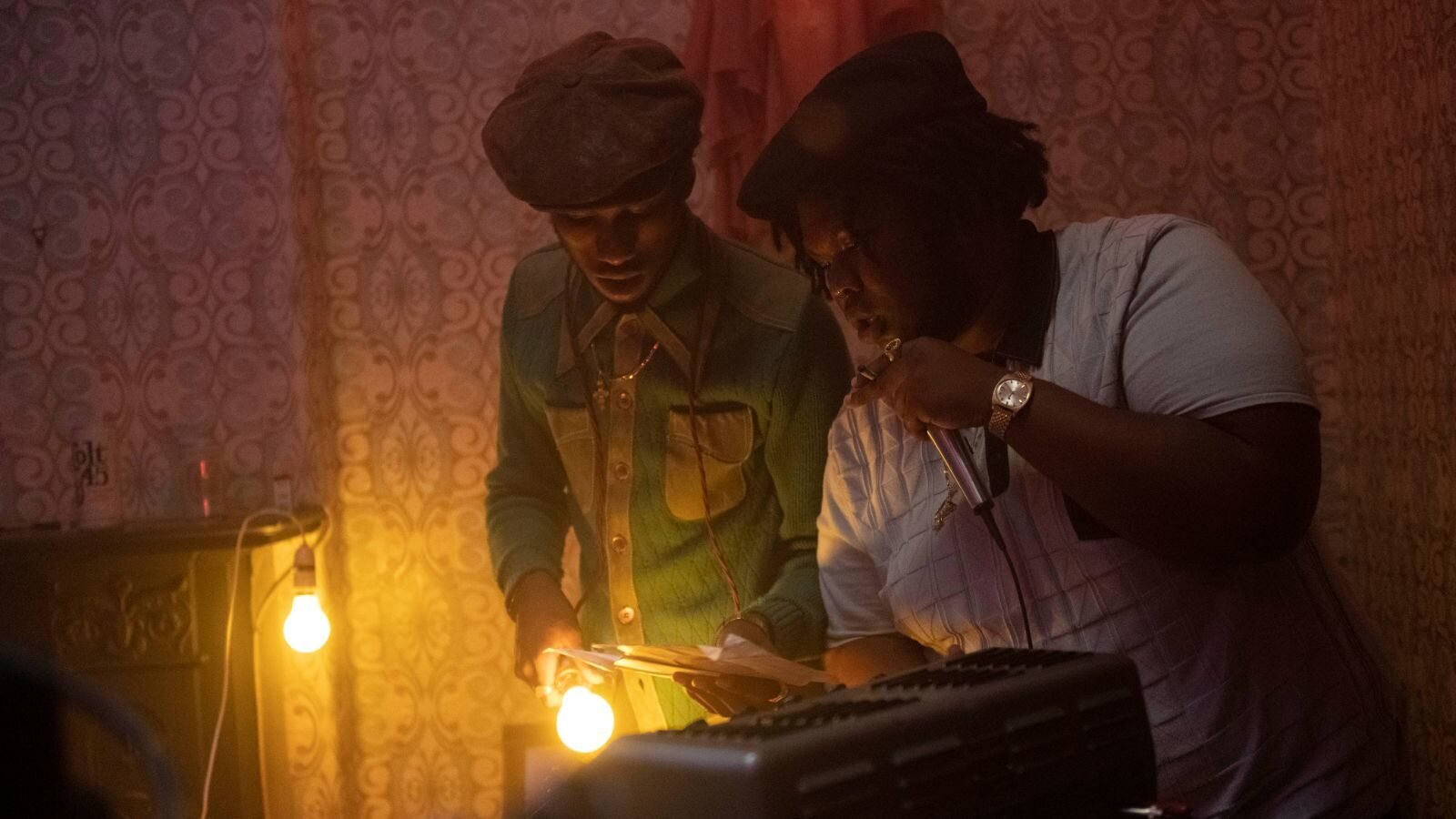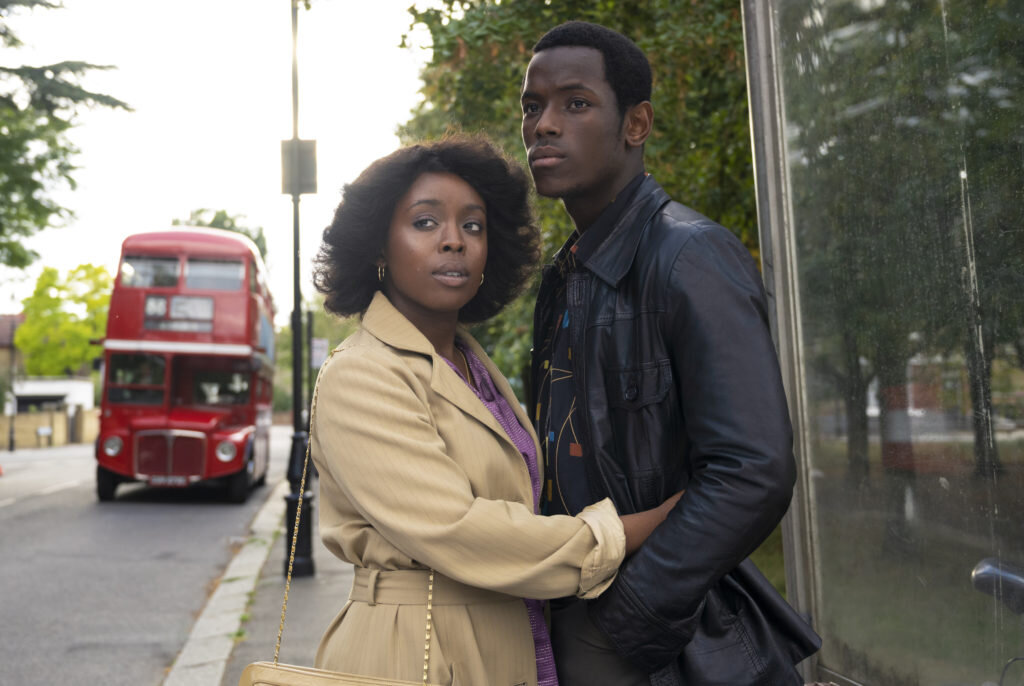Lovers Rock (2020): We’re Gonna Have a Party
Image courtesy of Amazon Prime Video
By Nick Sansone
When looking back at the year that is 2020, it is truly amazing to see how different the first two-and-a-half months of the year were from the last nine-and-a-half months. It was exactly a year ago this month that I worked at the 2020 Sundance Film Festival, seeing many great films in packed, sold-out theaters and attending staff and volunteer parties where we all ate, drank, laughed, and danced in packed rooms without a care in the world about anyone getting sick or dying as a result of these gatherings. And while I’ve never been the most comfortable person in loud, large gatherings, I have to admit I miss the sensation of being shoulder-to-shoulder with others in a crowded room with the music pumping. Even if it can be overwhelming for introverts like me, there is a certain beauty and poetry in it.
And that beauty and poetry is beautifully captured on film in British filmmaker Steve McQueen’s film Lovers Rock (2020), the second installment in his Small Axe anthology series of films that captures the lives of West Indian immigrants living in London throughout the latter half of the twentieth century (the whole series is available to stream on Amazon Prime). Each film tells a distinct, standalone story, capturing a different aspect of this community, but what distinguishes Lovers Rock from the others is not simply that it tells a fictional story with fictional characters while the other four are based on actual events, but also that it very deliberately focuses on Black love and joy over Black suffering and anger. The result is what is one of the best films of the year, a deeply exhilarating, fun, romantic, sexy and downright joyful cinematic experience that uses an impeccable soundtrack, costume design, and beautifully immersive cinematography to place the viewer squarely in its time and place.
Image courtesy of Amazon Prime Video
Set over the course of a single day in the summer of 1981, Lovers Rock has one sole focus: a large house party that goes all night, plays loud, righteous music, and is specially designed for young men and women to find love amid the drugs, alcohol, and reggae beats. One of these young women, named Martha (Amarah-Jae St. Aubyn) sneaks out of her house and meets up with her best friend who accompanies her to the party. Once they are there, they are almost-immediately hit on by various young men with both benign and not-so-benign intentions before Martha meets a young man named Franklyn (Micheal Ward). Despite some initial reservations, sparks begin to fly between Martha and Franklyn, and before long, their dancing turns to kissing, which turns to a full-on one-night romance that may or may not last beyond this twenty-four-hour timespan.
And while the Martha-Franklyn romance does form the heart of this film in many ways, Lovers Rock is really about the party, and it is a party for the ages. From the early moment when the DJs put on Carl Douglas’ 1974 hit single “Kung Fu Fighting,” the energy level soars and never comes down. The title of the film comes from a style of reggae music that took much influence from American soul music and focused on romantic themes in its lyrics, and this music is baked into every moment of this party. Smooth and upbeat and sexy in all the right ways, the lovers rock music sets a tone for the film that it maintains throughout, magnified by the two DJs who serve as the kind of irreverent comedic side characters that would not be out of place in a Shakespearean tragedy. Various other side characters and subplots that we come across at the party, such as one involving a confrontation between a woman named Cynthia (Ellis George) and slick womanizer Bammy (Daniel Francis-Swaby) that represents the darkest moment of the film, feed into the general vibe of the film while never neglecting the dark and repressive societal forces that always linger in the shadows.
Simply put, Lovers Rock is the most joyous film of 2020 and maybe of the last several years. While it may not carry the heavy “importance” that the rest of the Small Axe films and many of McQueen’s other films do, it nonetheless ranks with 12 Years a Slave (2013) and Widows (2018) as one of McQueen’s most creatively and emotionally realized works. Every aspect of this film not only serves its purpose in placing the viewer at this party, but it also makes the viewer feel as if they are a part of this community as they get away from the turmoil of the outside world and embrace the cultural ties that bring them together in the moment.
The film’s focus on these cultural ties and the collective experience of this community is emphasized at the very beginning of the film, when a group of women are cooking in the kitchen of the house where the party will start that night, and they begin singing a certain popular lovers rock song that will play a major role later on. The intricate, immersive cinematography by Shabier Kirchner (whose work on this and the other Small Axe films is easily his most notable to date) makes its presence first known here, as his handheld camera drifts around the space, getting close to the faces of those present in the space and even gazing at them over the shoulder of someone outside looking in. Even in a relatively quiet moment like this one (at least compared with the rest of the film), McQueen and Kirchner are striving to make the viewer feel fully present in the space.
But once the party gets going, the immersion into the party space becomes so hypnotic and visceral that it is truly infectious. Not only does Kirchner’s cinematography emulate the feeling of being in a party space like this and getting sometimes too close to certain partygoers’ faces, but everything from the completely authentic costume design by veteran designer Jacqueline Durran (whose work here is a stark departure from her acclaimed work on Pride & Prejudice (2005) and Little Women (2019)) to the lighting and production design serves to further the hot, sensual vibe in the room (there is a cutaway shot at one point where even the wallpaper appears to be sweating).
Image courtesy of Amazon Prime Video
And then about midway through the film, the party’s DJs throw on the certain popular lovers rock song alluded to above (“Silly Games” by Janet Kay), and what follows is one of the most magical, intoxicating and beautifully cathartic scenes in any film released in the year that is 2020. In this scene, the film’s technical prowess, the burgeoning romantic tension between Martha and Franklyn, and the film’s underlying emphasis on cultural ties and being in community all blend together in a deeply joyful and profound way. Kirchner’s handheld camera puts the viewer in the party, Martha and Franklyn groove together while gazing into each other’s eyes, and the partygoers continue to sing along to the song in unison even after the DJs have faded out the music. The partygoers joyfully singing this song together in an almost chant-like fashion, especially as they attempt to hit some of the impossibly high notes, is perhaps the perfect cinematic response to the year of 2020, one that emphasizes in beautiful and compelling fashion the inherent human need to be physically present in community with others, listening to healing, uniting music that embraces love and identity and pure, blissful euphoria.
Although Lovers Rock is not an “actor’s movie” in the traditional sense of the term, the two lead performances are worth mentioning. Amarah-Jae St. Aubyn, in particular, is terrific in her acting debut as Martha, portraying the young, wide-eyed, hopeless, romantic partygoer in a way that never feels forced and is instantly relatable to anyone who has ever gone to a gathering like this for the first time. And Micheal Ward, a British character actor in his most significant role yet, serves as a wonderful counterpoint to St. Aubyn, embodying a suave, romantic and confident swagger that still leaves room for ever-present insecurities (particularly in a couple of scenes late in the film).
Image courtesy of Amazon Prime Video
Despite there being a large number of poignant and beautiful small moments in this film’s exceptionally brief 70-minute running time, the one that is perhaps the most subtly affecting is the final shot of the film, which takes place in Martha’s bedroom the morning after the party. While it does mirror similar endings to recent films that take place over the course of one day/night (most notably Everybody Wants Some!! (2016) and Southside with You (2016)), there was extra poignancy in this ending, as it in some ways mirrors the societal transition from what most people knew as “normal life” to COVID-imposed isolation. After spending an entire whirlwind night surrounded by others in community, Martha is now back alone in her bedroom in her family home with only the memories of what she had previously experienced with her. And while this could be seen as a melancholy “back to reality” ending in an otherwise joyous film, it could also be seen as hopeful, hopeful that one day we will experience that type of night again, that we will be physically present in community celebrating life and love and music and identity again. And as the world looks ahead to the new year of 2021, the immense amount of love, joy, and hope that Lovers Rock offers should be welcomed and embraced by everyone.
Nick Sansone is a writer and aspiring filmmaker from Chicago. A summa cum laude graduate of DePaul University’s School of Cinematic Arts, he continues to study film independently and has appeared on different radio programs in the Chicagoland area to discuss contemporary cinema and the Academy Awards.






